Samsung Electronics: Global Tech Giant is an ESG pygmy
Synopsis: Ever since touching a record high of 96,800 KRW in January, the share price of Samsung Electronics has been on a constant decline. Around mid-January, the heir to the company, Lee Jae Yong was sentenced to more than two years of imprisonment by the Seoul High Court on charges of corruption and bribery. To add insult to injury, Samsung Electronics got downgraded on ESG ratings twice by Korea Corporate Governance Service. Inability to move swiftly to capture the global chip demand, failed mergers and acquisitions along with failure to capitalizing on US sanctions on China’s Huawei, has left Samsung standing on a fault line. EMAlpha’s AI-ML aided analysis tells that while South Korean firms, including Samsung, are making good progress on Environmental and Social issues, the record is not that good on Governance. This is strange because many of its global competitors do exceedingly well in Governance evaluation, thus helping their overall ESG scores. This rightfully reflects in the valuation. Compared to its peers, Samsung is a laggard in market value. While Samsung’s products are well in demand, the company has to change with times and address its issues head on, especially the ESG issues which are increasingly getting factored in the stock price.
Samsung conglomerate: One of the biggest chaebols of South Korea
In emerging markets, evaluating a company on its ESG performance is a huge challenge for a variety of reasons such as lack of reliable data and complicated disclosures. Apart from that, there are also peculiarities like the complex ownership structure that has certain implications, which is a big issue in many EMs. The chaebol or conglomerate business structure of South Korea is an interesting case here. The term chaebol refers to a complex, conglomerate-type ownership structure that originated in South Korea in the 1960s, comprising of either a single large company or several groups of companies.
Samsung, Hyundai, SK Group, and LG Group are among the biggest and most prominent chaebols. While they are doing well on the business front, there are several issues associated with such an arrangement: their oversized influence and non-transparent relationship with politicians and government officials to name a few. Although South Korean firms are making good progress on Environmental and Social issues, the record is not as elegant when it comes to Governance. The ‘chaebol way of doing business’, could be the culprit here.
With a market cap of US $ 457 billion (as of 27th July 2021), Samsung Electronics is the crown jewel of the Samsung chaebol. In terms of value, it constitutes about one-fifth of the South Korean stock market. In the past five years, the stock has appreciated in value to become 2.5x in price. As of 27th July 2021, the stock was trading at 78,500 KRW. Compared to its peers, Samsung is a laggard in market value and the reasons are related to its poor governance track record. Considering the importance of ESG and Sustainability filters for global asset managers, the poor governance record is having a deep impact on Samsung’s stock price.
Figure 1: Share price of Samsung Electronics over the past 5 years
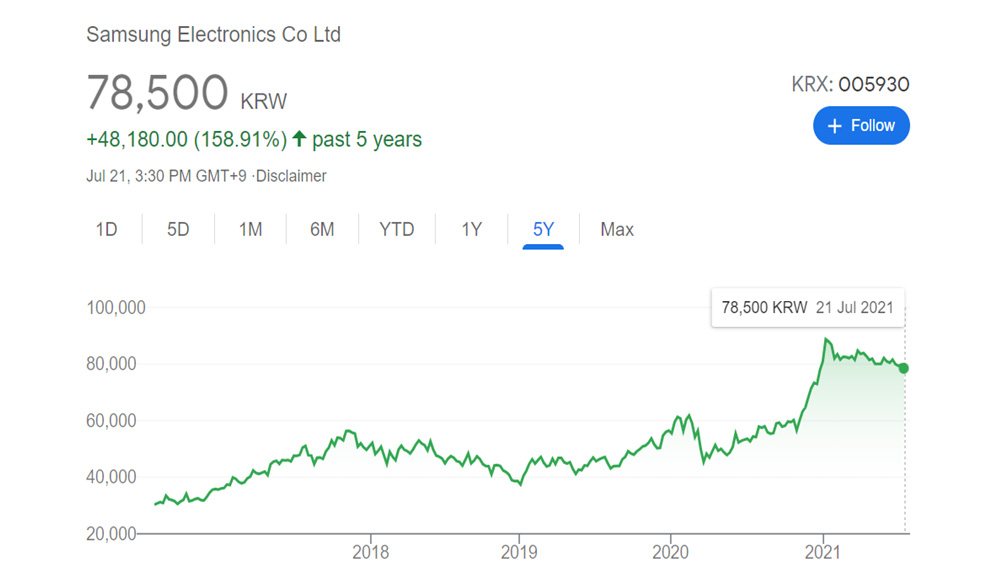
Source: Google
For the quarter ending March 2021, the company reported a profit of a little more than US $ 6 billion. It is also sitting on a cash pile of US $ 182 billion.
Figure 2: Financial report for the past four quarters (in Korean won)

Source: investing.com
Buoyed by stronger memory chip prices and recent corporate investments in data centers requiring large quantities of servers and hence memory chips, Samsung Electronics is expected to report even stronger numbers for the 2nd quarter of 2021 at the end of July.
What’s up with the stock price?
Despite sturdy financials along with new products in the offering, the share price of Samsung Electronics has been on a gradual downhill since January when the stock hit a record high of 96,800 KRW.
Figure 3: Share price of Samsung Electronics year-to-date
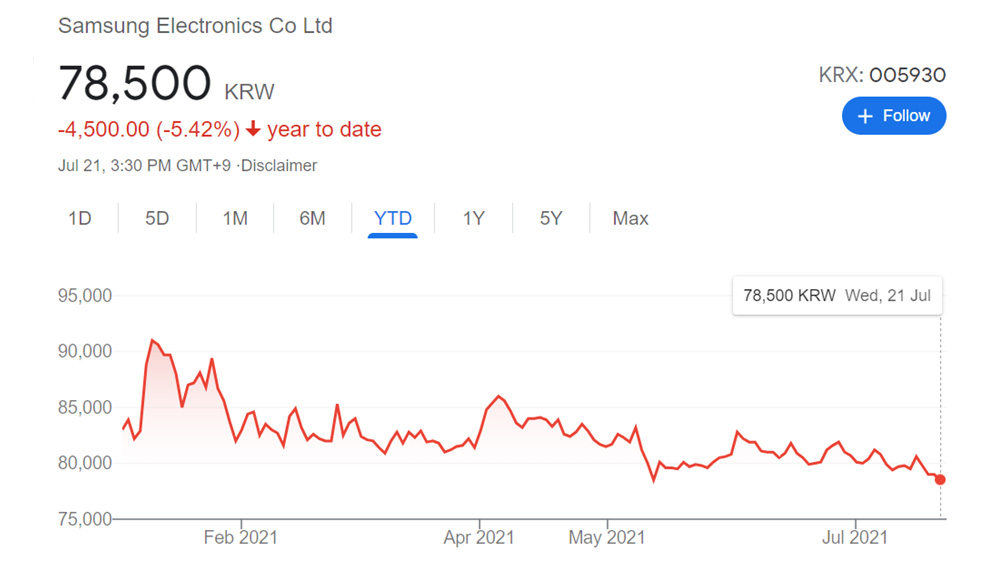
Source: Google
The stock has also underperformed. During the time when Samsung Electronics share lost 5.4%, the broader Kospi 50 index gained 5.8%.
Figure 4: Share price of Kospi 50 year-to-date
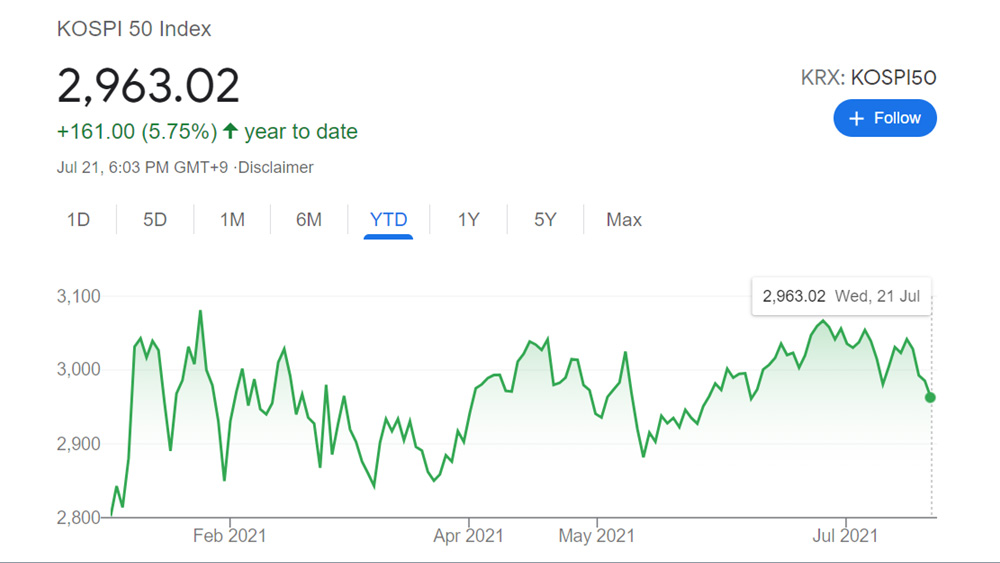
Source: Google
On a relative basis, the divergence is significant enough. As mentioned earlier, Samsung Electronics constitutes about one-fifth of the Korean stock market. As such, it becomes necessary to know the reason behind this bifurcation in the stock prices.
Samsung Group heir Lee Jae Yong goes back to jail
On 18th January 2021, the Seoul High Court gave Samsung group heir Lee Jae Yong two and a half years of prison sentence in a case that has been going on for years and that toppled the chair of former South Korean President Park Geun-Hye. The court found Lee guilty of misappropriation and bribery. Following the sentence, Samsung Electronics share dipped by 4%. And it can be seen from Figure 3 that the share price of Samsung Electronics has been on the decline ever since mid-January.
Read More: What is cooking in South Korea on ESG?
Although the hearing was relevant, this wasn’t the only time that Lee Jae-Yong found himself on the wrong end of the law. In September of 2020, he faced a slew of charges. He was charged with unfair trading, stock manipulation, and breach of trust about the 2015 merger between Cheil Industries Inc. and Samsung C&T, which was considered as a key step toward his succession. He was also accused of alleged accounting fraud at the pharmaceutical unit of Samsung Biologics.
The arrest of the heir apparent undoubtedly impacted the stock price. It also led many to warn of a big upcoming crisis at Samsung which has been functioning without a leader ever since the Seoul High Court’s sentence.
Finding mention in the bad books of ESG
On 06th April 2021, the Korea Corporate Governance Service (KCGS), a non-profit organization that offers environmental, social, and governance evaluations for companies, announced that it had downgraded the ESG ratings of nine companies, including that of Samsung Electronics. Due to the imprisonment of Lee Jae-Yong, Samsung Electronics was given a “B” in the governance category. Its overall rating was “B+”, down from the previous score of “A”. KCGS grades companies on their ESG endeavours every quarter. It has a seven-level rating system: S, A+, A, B+, B, C, and D.
Table 1: Share price of Samsung Electronics from 1st April 2021 to 12th April 2021
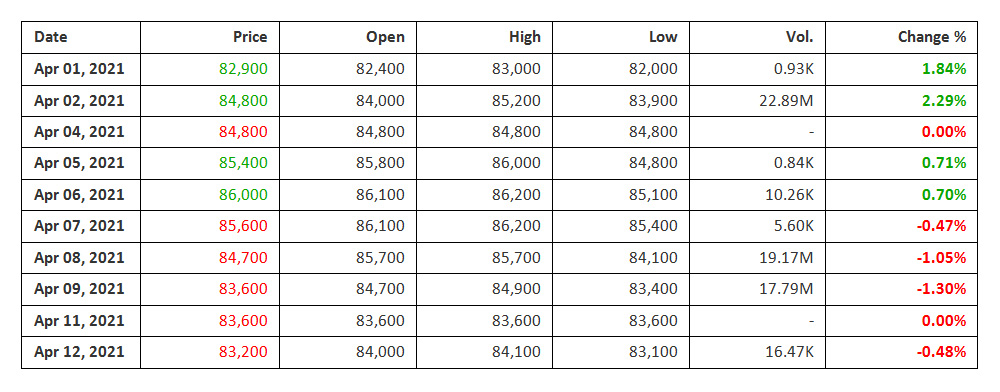
Source: investing.com
As can be inferred, the stock price slipped following the April 06 release by Korea Corporate Governance Service downgrading Samsung Electronics on ESG.
Once again on 14th July 2021, KCGS downgraded Samsung Electronics from B+ to B, while dropping its governance rating from B to C. This demotion was due to the Korea Fair Trade Commission (FTC) accusing the conglomerate of a transfer-pricing scheme that resulted in the transfer of wealth to one of its affiliate companies, thus enriching the family members of the owner.
Figure 5: Share price of Samsung Electronics over the past month
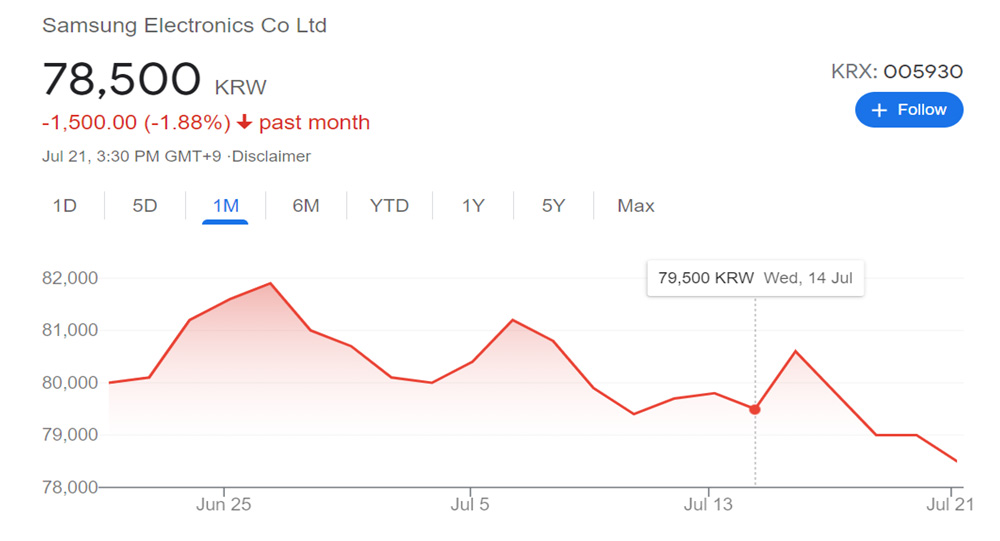
Source: Google
The share price has undergone some correction following the 14th July ESG downgrading of Samsung Electronics. It remains to be seen how the near term plays out for the stock price.
Samsung needs to tidy up
Ever since January when the economic recovery was gaining ground, analysts have repeatedly forecasted the share price of Samsung Electronics to cross 1,00,000 KRW. But after hitting a record high of 96,800 KRW in mid-January, the stock has been on a downslide. There is, without a question, a great demand for its smartphones (which took a hit due to the delta variant) and products and it seems very likely that the company will post good profits for 2Q2021. The company is also looking to increase investment in its semiconductor division. While all of these present optimism for the company, what can’t be denied is the lingering and ever-growing ESG issues at the company. Ever since the arrest of Lee Jae-Yong, the company has been without a leader. While Samsung’s semiconductor ambitions are praiseworthy, Intel is going full blast with talks of acquiring GlobalFoundries for $30 billion. Samsung has also struggled with mergers and acquisitions since 2016. Considering the above factors, it won’t be unreasonable to say that Samsung is currently placed on a fault line which possibly may not bode well for the company.
How EMAlpha can help?
There is, undoubtedly, a profound ESG movement going all over the globe right now. From countries to asset managers, from millennial investors to the old school stalwarts, everybody’s counting on the ESG chip for a better future and a better return on investment. There is almost an undisputed global consensus that businesses must incorporate sustainability into their operations.
While the ESG deliberation is appreciable, one can’t deny the challenges facing the ESG movement. Be it greenwashing, lack of proper metrics, frameworks, or quality of ESG information, ESG still has plenty of hurdles to overcome for it to be a sustainable investment instrument. It is here that EMAlpha with its proprietary AI-ML techniques becomes a much-needed tool for investors.
- Go beyond the official reported version – The data source matters and there is a need to look beyond what the companies are reporting and what the official version is. It is essential to rely on the company-reported data because other sources might not be collating as much information. Although often, there are other sources as well for environment-related information. They include the information disclosure as mandated by regulators and the EMAlpha algorithms scan through unstructured data to pick the unofficial information too.
- No two ESG scores are the same despite the same headline figure – It is the composition that makes a big difference and all the three parameters that constitute ESG need to be evaluated separately. The EMAlpha algorithms provide separate scores for E, S, and G so that an investor can review the sectoral performance more transparently. Over and above, a key feature of EMAlpha’s NLP algorithms is that the attribution analysis is fairly simple.
- An ESG score without context and background is meaningless – The ESG is as much about intent as it is about execution. For this balanced evaluation, having an understanding of the local factors is very crucial. A very good ESG track record (probably more driven by excellent performance in E and/or S) may hide serious Governance related risks and the investors can only ignore them at their peril. EMAlpha analysis meticulously incorporates this critical part of the ESG evaluation jigsaw puzzle.
References
- Lee Jae Yong: Samsung heir gets prison term for bribery scandal https://www.bbc.com/news/business-55674712 (Accessed on 21st July 2021)
- Samsung heir Jae Y Lee sentenced to 2 1/2 years in prison for bribery and embezzlement https://edition.cnn.com/2021/01/18/business/samsung-jay-y-lee-prison-sentence-intl-hnk/index.html (Accessed on 21st July 2021)
- Samsung Elec sits idly on $ 182 billion cash hoard as invest put on hold over leadership void https://pulsenews.co.kr/view.php?sc=30800021&year=2021&no=701839 (Accessed on 21st July 2021)
- Samsung Electronics expects 53% increase in operating profit https://www.wsj.com/articles/samsung-electronics-expects-53-increase-in-operating-profit-11625617363 (Accessed on 21st July 2021)
- Samsung Electronics historical data https://www.investing.com/equities/samsung-electronics-co-ltd-historical-data (Accessed on 21st July 2021)
- Samsung Electronics shares hit year’s second-lowest mark http://www.koreaherald.com/view.php?ud=20210720000949 (Accessed on 21st July 2021)
- Samsung urged to use 100% green energy in South Korea and Vietnam https://asia.nikkei.com/Spotlight/Environment/Climate-Change/Samsung-urged-to-use-100-green-energy-in-South-Korea-and-Vietnam (Accessed on 21st July 2021)
- KCGS downgrades ESG scores of Samsung, SKT and LGD http://www.koreaherald.com/view.php?ud=20210406000851 (Accessed on 21st July 2021)
- Over a dozen major companies downgraded in ESG ratings https://m.koreatimes.co.kr/pages/312139.html?gosh (Accessed on 21st July 2021)
EMAlpha Products and Services
In most Emerging Markets, information discovery is a major challenge. For example, even if global investors do show interest, how do they solve the problem of timely access to information? The world’s largest capital allocators hold USD 60 trillion and they include GPIF (Japan), GPF (Norway), ADIA (Abu Dhabi), GIC (Singapore) etc. However, only 10% of the capital gets allocated to EMs and ~90% goes to G10. The big hurdle for EMs is: Foreign investors cannot access relevant local information in a timely fashion.
Most market participants and investors from across the world realise that the low rates in G10 makes EM attractive for investors. But, a) Information access is usually a cost and time intensive process for investors, and b) In many EMs, language is a big barrier and because of multiple regional languages, there is a significant delay before news makes it to the mainstream English language. To address these issues, you need solutions like, a) Real time news collection from multiple languages and, b) Instantaneous machine translation and text analytics leading to actionable recommendations for investors.
There are further challenges such as ensuring that companies behave responsibly and that they adopt sustainable business practices. There is a need to ensure that the investors are contributing towards making the world a better place by making investment decisions which reward responsible behaviour of companies. Case in point, ESG (Environmental, Social & Governance) which is increasingly being used as a filter for investment decisions. There are other issues as well such as which data to use and a lack of a standardized framework for evaluation.
Some of these issues are too important to be postponed to a later date and it is in this regard that EMAlpha is making its contribution. EMAlpha has developed a Flexible ESG Framework Management System which is a proprietary technology that makes ESG scores framework agnostic, thus allowing for quick adaptation. In addition, the users decide what matters to them and the EMAlpha system does a classification into E, S, G and more granular categories.
EMAlpha also has solutions for Multilingual data collection and real time targeted information which are based on proprietary processes to collect relevant data across multiple markets. The coverage expands across emerging market equity, currencies and commodities and the work has also been very successful in testing the signals in some key markets for live trading strategies. This is a continuous cycle and a virtuous loop that allows for iterative improvement through AI-human feedback.
With developments in AI and technology in areas like NLP, there are considerable new possibilities to bridge the gap in information between Emerging Markets and the more Developed Markets. This is an area which is turning out to be very exciting because some of the tools mentioned were not available even a couple of years ago. This implies that the evolution in the field will only get faster as time goes on. While the Emerging Markets and the Capital Flow Conundrum is a complex one, there is now much more hope and optimism that with the usage of technology, things will only get better.
At EMAlpha, the ESG team is doing further research on why some issues like Social get more prominence as compared to others like Environmental or Governance issues. To look at specific cases in the context of ESG is a very intense yet interesting exercise and this has been an incredible learning experience for the EMAlpha Research team. The data, information and ratings are a humongous challenge for ESG and it takes time to reach to the depth of the issues as the field is evolving very quickly.
EMAlpha is making a solid contribution in tackling these challenges. EMAlpha has solutions for ESG which are practical, user friendly and although not too simplistic yet easy to use. EMAlpha has developed a Flexible ESG Framework Management System which is a proprietary technology that makes ESG scores framework agnostic, thus allowing for quick adaptation. In addition, the users decide what matters to them and the EMAlpha system does a classification into E, S, G and more granular categories.
We strongly believe that the entire ESG ecosystem requires multiple stakeholders to pull in the right direction in order to make it operational and that will be the most critically determining factor for ESG’s success in making the corporate responsibility actually work. Most importantly, the investors should view ‘E’, ‘S’ and ‘G’ individually and should not confound issues when it comes to the comprehensive ESG evaluation. It is important to understand the right reasons behind ESG investing because this bias could hurt their investment decision making and portfolio performance.
Research Team
EM Alpha LLC
For more EMAlpha Insights on Emerging Markets, please visit https://emalpha.com/insights/. To know how you can use EMAlpha’s unstructured data and ESG (Environmental, Social and Governance) solutions for better investment decisions, please email us at [email protected].
About EMAlpha:
EMAlpha, a data analytics and investment management firm focused on making Emerging Markets (EMs) more accessible to global investors and unlocking EM investing using machines. EMAlpha’s focus is on Unstructured Data as the EMs are particularly susceptible to swings in news flow driven investor sentiment. EMAlpha works on information discovery and ESG solutions for Investors in Emerging Markets, using AI and NLP tech. Our mission is: “To help increase capital flow, in terms of FDI and FPI, to Emerging Markets by lowering information barriers using AI/NLP”. EMAlpha Products help achieve both alpha and ESG solutions and the idea is to help asset allocators, asset managers, banks and hedge funds along with companies with cost and time efficient access to relevant information. We use thoroughly researched machine learning tools to track evolving sentiment specifically towards EMs and EMAlpha pays special attention to the timely measurement of news sentiment for investors as these markets can be finicky and sentiment can be capricious. Our team members have deep expertise in research and trading in multiple Emerging Markets and EMAlpha’s collaborative approach to combining machine learning tools with a fundamental approach help us understand these markets better.
Disclaimer:
This insight article is provided for informational purposes only. The information included in this article should not be used as the sole basis for making a decision as to whether or not to invest in any particular security. In making an investment decision, you must rely on your own examination of the securities and the terms of the offering. You should not construe the contents of these materials as legal, tax, investment or other advice, or a recommendation to purchase or sell any particular security. The information included in this article is based upon information reasonably available to EMAlpha as of the date noted herein. Furthermore, the information included in this site has been obtained from sources that EMAlpha believes to be reliable; however, these sources cannot be guaranteed as to their accuracy or completeness. Information contained in this insight article does not purport to be complete, nor does EMAlpha undertake any duty to update the information set forth herein. No representation, warranty or undertaking, express or implied, is given as to the accuracy or completeness of the information contained herein, by EMAlpha, its members, partners or employees, and no liability is accepted by such persons for the accuracy or completeness of any such information. This article contains certain “forward-looking statements,” which may be identified by the use of such words as “believe,” “expect,” “anticipate,” “should,” “planned,” “estimated,” “potential,” “outlook,” “forecast,” “plan” and other similar terms. Examples of forward-looking statements include, but are not limited to, estimates with respect to financial condition, results of operations, and success or lack of success of certain investment strategy. All are subject to various factors, including, but not limited to, general and local economic conditions, changing levels of competition within certain industries and markets, changes in interest rates, changes in legislation or regulation, and other economic, competitive, governmental, regulatory and technological factors affecting the operations of the companies identified herein, any or all of which could cause actual results to differ materially from projected results.



